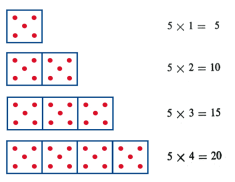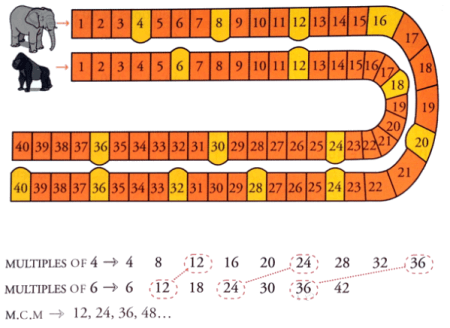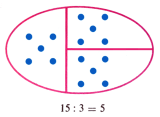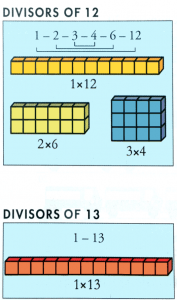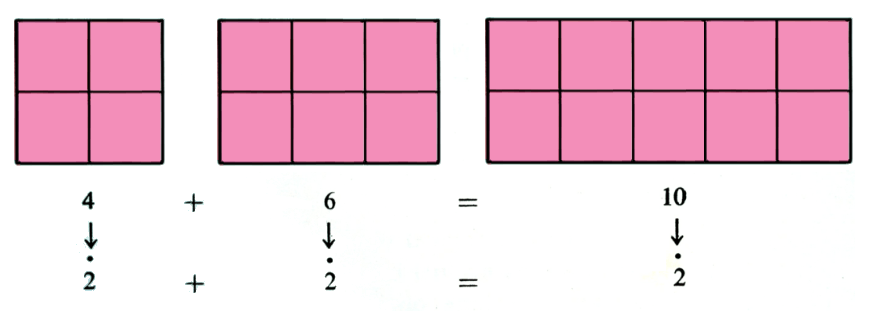Multiple of a number is the result of multiplying that number by any other.
3·1=3 => 3 is multiple of 3
3·2=6 => 6 is multiple of 3
3·3=9 => 9 is multiple of 3
3·4=12 => 12 is multiple of 3
The products obtained are multiples of 3.
Similarly:
Los multiples of 5 are 5,10,15,20,25,30…
los multiples of 7 are 7,14,21,28,35,42…
and so on…
As we see we can always multiply these numbers by a different number and obtain more multiples, so there are many multiples as numbers!
Any number has an infinite number of multiples.
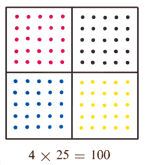
100 is a multiple of 4 and 25.
All multiples of 100, ie, all numbers ending in two zeros are also multiples of 4 and 25.
To express the multiples of a number we use a dot on the number:
![]() = {5,10,15,20…} it reads like all the multiples of 5.
= {5,10,15,20…} it reads like all the multiples of 5.
HOW TO KNOW IF A NUMBER IS A MULTIPLE OF 2?
Here is a list of the first 15 multiples of 2:
2, 4, 6, 8,10
12,14,16,18,20
22,24,26,28,30
Just look: a multiple of 2 always end in even number!(0,2,4,6,8)
If a number ends in 0 or even number, the number is a multiple of 2.
HOW TO KNOW IF A NUMBER IS A MULTIPLE OF 3?
Here is a list of the first 10 multiples of 3:
3, 6, 9,12,15
18,21,24,27,30
Just look: If you add up all the digits of a number the result is in the same list!
12 => 1+2 = 3
15 => 1+5 = 6
18 => 1+8 = 9
21 => 2+1 = 3 (start again)
24 => 2+4 = 6
27 => 2+7 = 9
30 => 3+0 = 3 (start again)
If the sum of the digits of a number is 3 or a multiple of 3, the number is a multiple of 3.
The way to explain this is:

Any number formed by the unit followed by zero is equal to a multiple of 3 plus 1
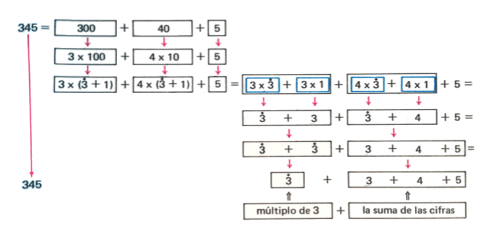
Any number is equal to the sum of a multiple of 3 plus the sum of the numbers.
Then if the sum of its digits is a multiple of 3, the number will also be a multiple of 3.
HOW TO KNOW IF A NUMBER IS A MULTIPLE OF 4?
For this example we need a list of larger numbers multiples of 4:
216, 918, 1032, 40, 512, 100
Just look: Although it is difficult to see, the last two digits are a multiple of 4 or ending in 0!
If the last two digits of a number is a multiple of 4 end in 0 or the number is multiple of 4.
HOW TO KNOW IF A NUMBER IS A MULTIPLE OF 5?
Here is a list of the top 10 multiples of 5:
5,10
15,20
25,30
35,40
45,50
Just look: A multiple of 5 always end in 0 or 5!
If a number ends in 0 or 5, the number is a multiple of 5.
With this we can extrapolate a rule for multiples of 10, as a multiple of 10 is a multiple of 5 that no ends 5.
So a 2 digit or more number of 2 that ending in 0 is a multiple of 10.
WHAT IS A DIVISOR?
If one number is a multiple of other number, these number is divisor of the first (and vice versa).
5 | 10 reads like 5 stripes 10
5 is a 10 divisor because 10 is a multiple of 5!
10 is a multiple of 5 because 5 is a 10 divisor
How to know if a number is a divisor of another? (For all we know it’s the opposite to know if is multiple)
¿Is 5 a 15 divisor?
We just have to split
15 : 5 = 3
The division is exact, therefore yes 5 is a divisor of 15, plus 15 is a multiple of 5.
How do we know the divisors of a number?
Are those where the number is a multiple of them:
divisors of 12 = {1,2,3,4,6,12}
because 12 is multiple of 1,2,3,4,6,12
divisors of 13 = {1,13} (in this case 13 is a prime number and just has like divisors the same number and unit)
(To calculate these divisors will do on the issue of factorizationn).
Como vemos a diferencia de los múltiplos, ¡solo existen un número limitado de divisores y esto es porque un número solo puede ser múltiplo de algunos números.
As we see unlike multiples, there are just a limited number of divisors of a number and this is because a number can only be a multiple of some numbers.
Any number has a finite number of divisors.
Then:
- When a number is a multiple of another? is the same as asking when the another is divisor of the first
- In addition a number is divisible by other when this other is divisor of this.
Therefore:
¿Is 10 multiple of 5? is the same as: ¿is 10 divisible by 5?
10 : 5 = 2 (exact division) then 10 is a multiple of 5!
Is 7 multiple of 2?
7 : 2 = 3,5 (not exact!) then 7 is not multiple of 2.
SOME PROPERTIES OF MULTIPLES (consequently divisors)
Every number is a multiple and divisor himself.
Two numbers can not be multiples of each other at the same time (antisymmetric property)
If a number is a multiple of another, and this in turn is a multiple of another, the first number is a multiple of the third (Transitive property)
The sum of the multiples of a number is also a multiple of that number.
Check this property with multiples of other numbers!
The subtraction of two multiples of a number is also a multiple of that number.
18 – 12 = 6
18 is multiple of 3
12 is multiple of 3
then 6 is multiple of 3
The product of the multiple of a number by another number is a multiple of the first number.
With all that we have learned, can you deduce what is a prime number?
